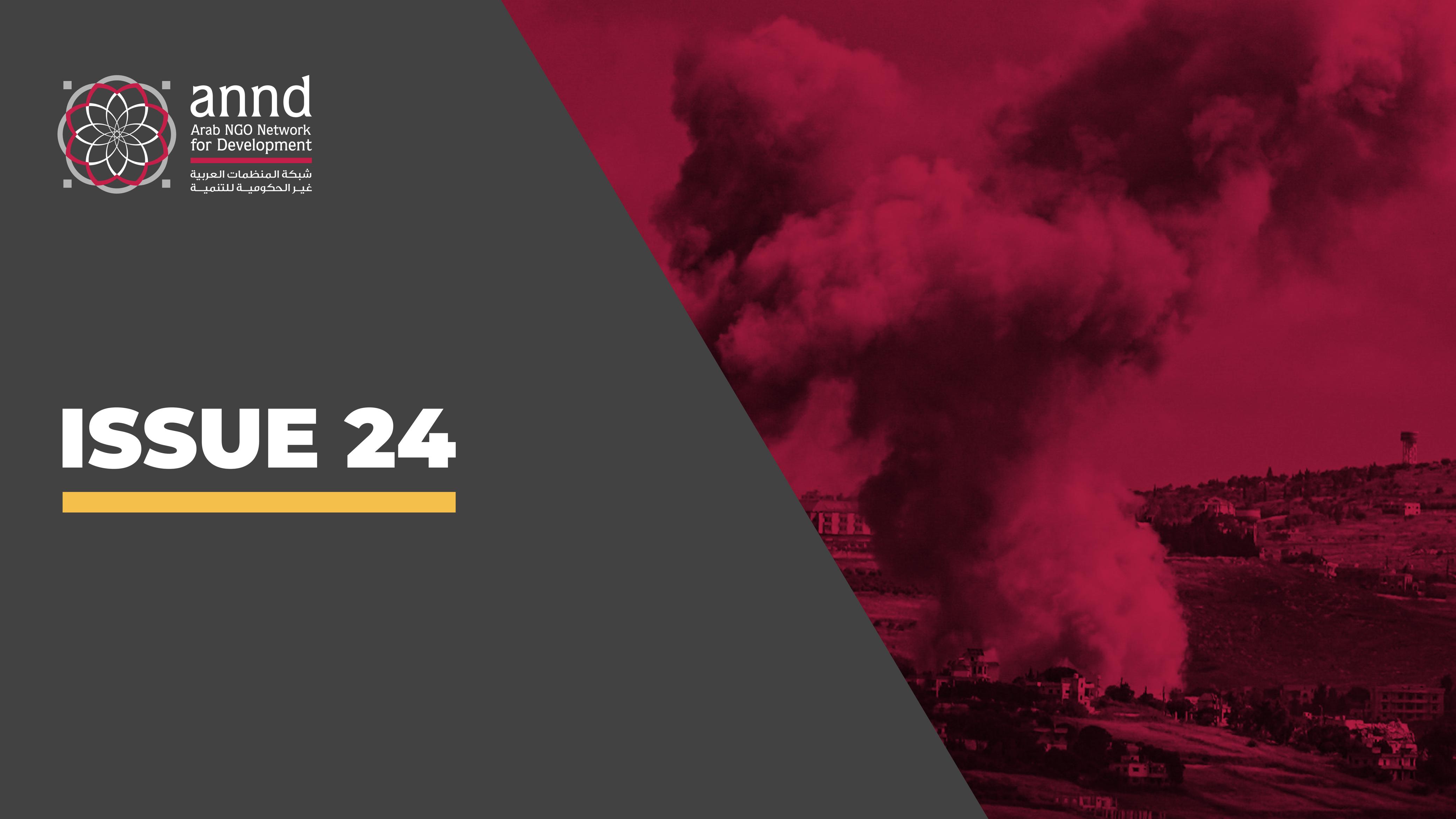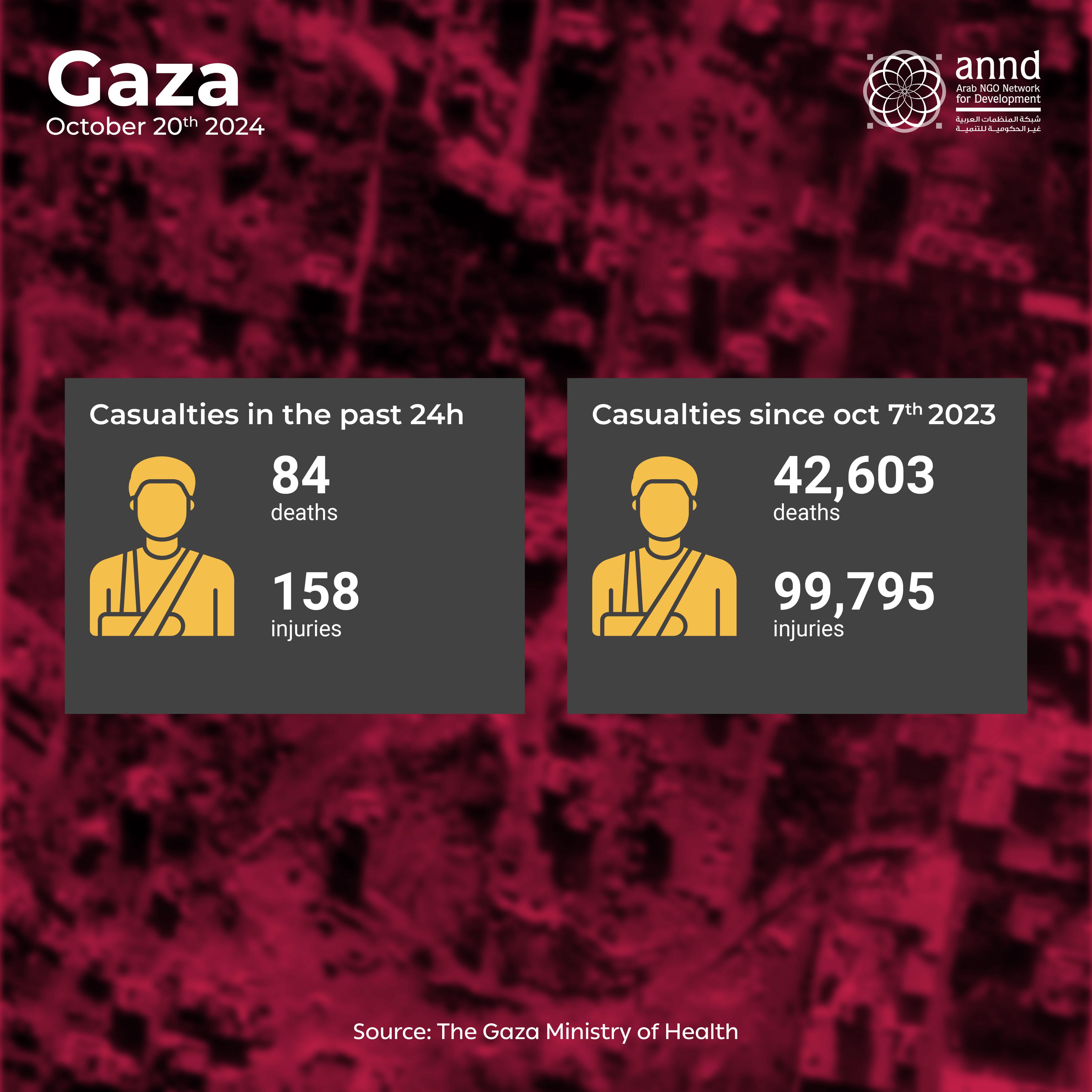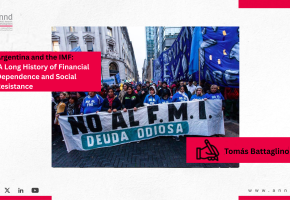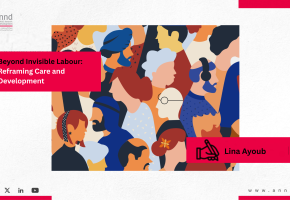A Region on Fire
Issue 24 - October 20, 2024
Despite numerous initiatives to reach a ceasefire in Lebanon, the path to a solution remains complicated
Northern Gaza is being "exterminated"
On the 380th day of the aggression on Gaza, the Ministry of Health in Gaza reported that the Israeli occupation committed seven massacres in the strip, resulting in 84 martyrs and 158 injured reaching hospitals in the past 24 hours.
This comes as the Israeli army continues the genocidal operations, bombing and burning entire residential areas in Jabalia camp, as well as Beit Lahia and Beit Hanoun. The army has blocked for the 16th day, the food, water, and medicines to tens of thousands of Palestinians trapped in these areas.
Israel committed a new massacre in Beit Lahia in the northern Gaza strip, where more than 80 Palestinians were martyred, in addition to dozens of injured and missing people. Another massacre was committed by bombing a school sheltering displaced people in Al-Shati refugee camp.
The Israeli army announced that the commander of the Israeli Army was killed and another officer was seriously injured during fighting in the northern Gaza Strip in Jabalia.
The Ministry of Health in Gaza reported that since October 7, 2023, the number of Palestinian martyrs from the Israeli military campaign has risen to 42,603, and the number of injured to 99,795.
Tor Wennesland, the United Nations Special Coordinator for the Middle East Peace Process, condemned the Israeli attacks, namely the Beit Lahia massacre committed by Israel in northern Gaza on Saturday evening.
Mr. Wennesland noted that the Palestinian people are living a "nightmare," with the painful and horrific scenes escalating daily, in violation of international and humanitarian laws. The UN coordinator's statement stressed that "there is no safe place in Gaza," emphasizing the need for a ceasefire, the release of hostages, the end of Palestinian displacement, and the unconstrained delivery of aid.
Palestinian medical sources reported that Israel demanded medical teams evacuate hospitals in the northern Gaza Strip immediately.
Battlefield Developments in Lebanon
Lebanon experienced a heated Sunday evening as airstrikes hit most areas in the south, Beqaa, and southern suburbs of Beirut as well as the Lebanese capital. Israel decided to target Al-Qard Al-Hasan Association, a financial entity that supports Hezbollah, with centers spread across Lebanese territory. Multiple airstrikes caused significant destruction to buildings and properties, 11 of them targeted the southern suburbs of Beirut. The Israeli spokesperson issued warnings to evacuate areas within 500 meters of Al-Qard Al-Hasan centers, triggering a large displacement from some areas to safer regions and causing heavy traffic in Beirut.
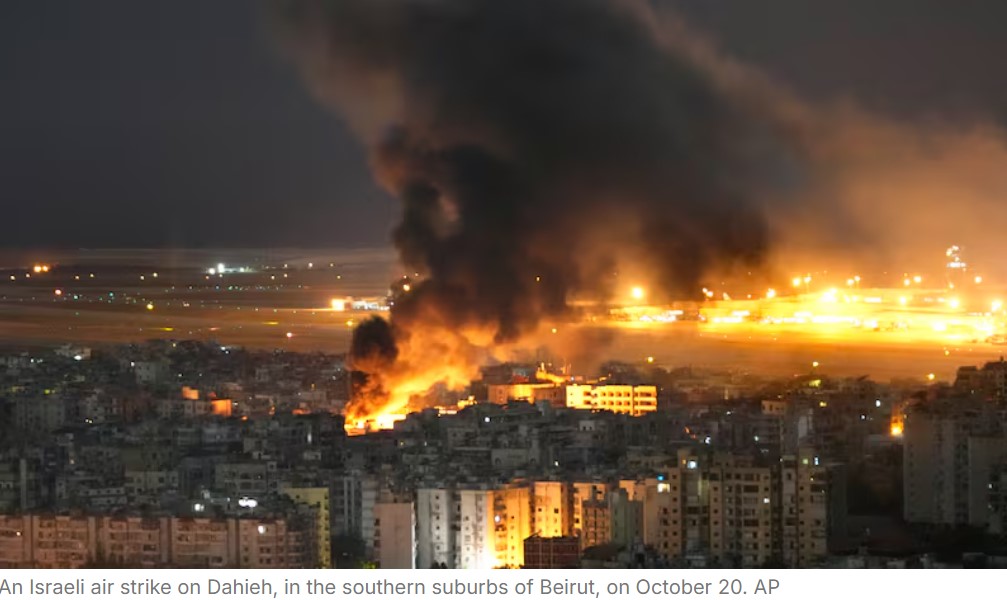
The escalation anticipated the expected visit of the U.S. Special Envoy to Lebanon Amos Hochstein on Monday. He's supposed to propose a ceasefire based on the implementation of the amended UN Security Council Resolution 1701. The proposed amendment would grant UNIFIL in southern Lebanon a broader mandate covering the buffer zone between Lebanon and Israel. However, the Speaker of the Lebanese Parliament confirmed this proposal is rejected and non-negotiable, emphasizing that no presidential election will take place before a ceasefire.
The Israeli army targeted Hezbollah's intelligence headquarters and an underground weapons production facility in Beirut, in addition to striking a Hezbollah intelligence leader. Four airstrikes hit the southern suburbs on Sunday morning after an Israeli warning to evacuate certain buildings in Harat Hreik.
The Israeli air force carried out heavy airstrikes in the south, particularly at the entrance to the city of Nabatieh and the road leading to it, resulting in four civilian deaths and the destruction of residential units and roads. An Israeli airstrike targeted the Islamic Health Society center in Deir Al-Zahrani, killing a paramedic and temporarily cutting off the main road between Nabatieh and Sidon.
In the Beqaa region, airstrikes continued on the border crossings and areas between Lebanon and Syria, including Al-Mashraf, Hosh Sayyed Ali, and the hills and outskirts of Hermel in the far northeast of Lebanon. Multiple heavy airstrikes were also recorded on numerous villages and towns. According to “Yedioth Ahronoth”, the Israeli army will add another reserve brigade to its forces operating in southern Lebanon.
Sunday morning, sirens signaling a level 3 danger, indicating severe risk, were sounded inside the UN peacekeeping mission (UNIFIL) centers in the town of Maarakeh. In the afternoon, the Israeli army directly targeted a Lebanese army vehicle on the Ain Ebel-Hanin road in southern Lebanon, resulting in the death of three Lebanese soldiers.
Meanwhile, Hezbollah launched dozens of rockets targeting northern Israel, shaking the city of Safed.
Ground clashes persisted on all fronts, particularly along the Qawzah-Ramiya axis (western sector), to repel Israeli ground incursions.
Despite the proximity of the airstrikes to Beirut's airport, air traffic remained unaffected, and a Middle East Airlines (MEA) flight landed amid continued bombardment of the southern suburbs.
The Ministry of Health report from Sunday indicated the death of 16 individuals and the injury of 59 others due to Israeli airstrikes, bringing the total death toll since the beginning of the aggression to 2,464, with 11,530 injured.
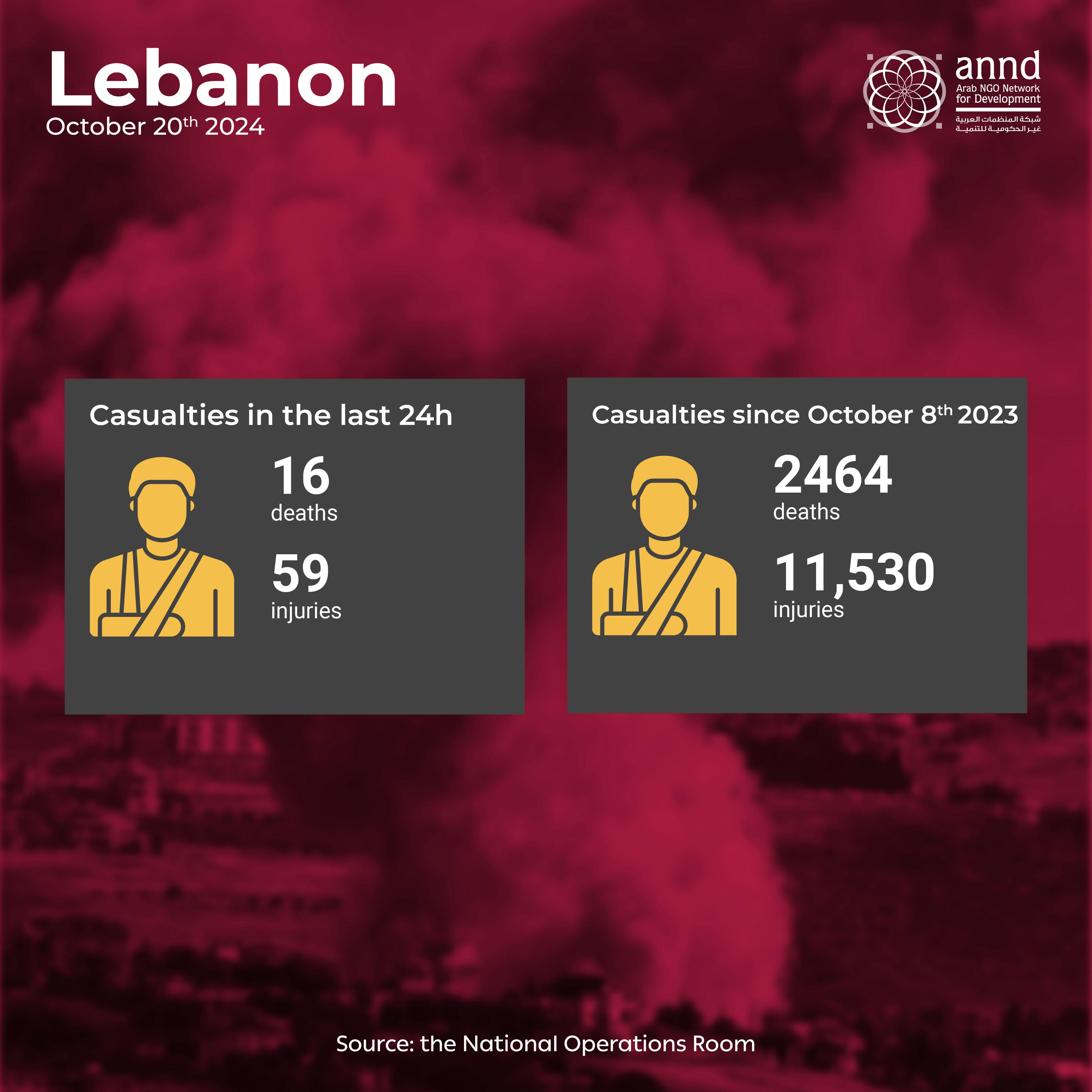
Political Positions in Lebanon
Lebanese Foreign Minister Abdullah Bou Habib headed to Europe, starting a tour from Italy, to participate in the G7 foreign ministers' meeting. To aim to explain Lebanon's position, calling for a ceasefire and an end to Israeli aggression on Lebanese territory through the full and balanced implementation of UN Security Council Resolution 1701, reinforcing the Lebanese army’s deployment south of the Litani River in accordance with the resolution, and requesting urgent humanitarian assistance to address the displacement of about a quarter of Lebanon’s population due to the aggression.
This tour will also include visits to the Vatican, France, and UNESCO in Paris to discuss how to protect Lebanese heritage sites and support Lebanon’s public education sector.
Lebanese are divided regarding the American initiative brought by special envoy Amos Hochstein, which involves expanding the Resolution 1701. Some believe the resolution cannot be amended, and no presidential election should occur before a ceasefire. This view is expressed by the Speaker of Parliament backed by Hezbollah and its allies, in response to Iranian pressure, as articulated by the Iranian parliament speaker and foreign minister during their visit to Lebanon last week.
Iran side is willing to show flexibility concerning the conflicts in Lebanon and Palestine, agreeing to separate Lebanon’s front from Gaza’s to save Hezbollah and avoid an Israeli strike on Iran. Israel remains firm in its stance against the presence of any weapons in the border region, insisting its strikes on Iran are to eliminate the threat posed by Iran.
Prime Minister Najib Mikati expressed the second view regarding the US and French initiatives, he stressed that the Lebanese consensus seeking an immediate cease-fire, the implementation of the Resolution 1701, and sending the army to the south.
Metropolitan Elias Audi, the Orthodox Archbishop of Beirut and its dependencies, emphasized the need to elect a president who can negotiate on behalf of Lebanon, rather than being a bargaining chip at the negotiation table. He stressed that Parliament must fulfill its constitutional duty as soon as possible, stating that this duty is an obligation, not a choice, and that the Lebanese people should not wait for external actors. The responsibility falls on the Lebanese people, who need statesmen capable of making historic decisions to save Lebanon.
Humanitarian Response in Lebanon
A Saudi plane carrying relief materials arrived at Beirut International Airport, marking the eighth flight in the air bridge between Saudi Arabia and Lebanon.
International Positions
Speaker of the Iranian Parliament Mohammad Bagher Ghalibaf made controversial statements about Lebanon. He said that "Iran is the key pillar of support for Lebanon, leaders, and people.” He added that "the strategic defeats suffered by the Israeli army in the battlefield have made the situation extremely difficult for Israel." Ghalibaf expressed gratitude to "all Lebanese citizens and officials who showed him love during his visit to Lebanon," and stated: "We must not forget that we are all soldiers in the service of the Islamic Republic of Iran."
Iranian Foreign Minister Abbas Araghchi declared that any attack on Iran would be considered crossing red lines and would not go unanswered. He warned that any attack on Iran’s nuclear facilities would be met with a similar attack and that Israel would receive a response proportionate to any attack. He added that Iran has not targeted Israeli economic and civilian facilities but only military targets and that Tehran has identified all Israeli targets and will strike them in response to Israeli attacks on Iranian targets.
The Honorary Consulate of Nepal in Lebanon condemned "the dire situation faced by the Nepalese battalion participating in the United Nations peacekeeping force, UNIFIL, in the Meiss al-Jabal region of southern Lebanon." The consulate noted that "since September 27, 2024, the battalion has received no supplies of food or water due to road closures, placing the soldiers in real danger, and they have been without water for two days." It condemned the blockade, considering the situation unacceptable under any circumstances, and deemed it a blatant violation of the protection principles that UN forces in conflict zones should enjoy, especially since they are not a party to the conflict. The consulate called on the international community and UN organizations to immediately intervene to open humanitarian corridors and ensure the urgent delivery of logistical supplies, including food, water, and health support, to guarantee the safety of the soldiers and the continuation of their mission. It concluded by warning that international inaction at this critical moment could result in severe humanitarian consequences.
French Minister of the Armed Forces Sébastien Lecornu reiterated his country's call for a ceasefire in Lebanon and Gaza, warning of the dangers of a direct conflict between Iran and Israel. Lecornu stated, "Time is running out, and something more dangerous may emerge in the coming weeks and days." He noted the political and diplomatic disagreements surrounding how Israel is conducting its wars, and reaffirmed that Israel “is our ally.”
Israeli Defense Minister Yoav Gallant announced that Israel has now moved from the phase of defeating Hezbollah to its destruction.
The office of Israeli Prime Minister Benjamin Netanyahu confirmed today, Sunday, that he spoke with former US President and current presidential candidate Donald Trump, stating that Israel makes its decisions based on its national interests.
The Israeli Foreign Minister announced that Israel would take legal action against French President Macron to prevent Israeli companies from participating in a maritime trade exhibition.
Yedioth Ahronoth reported that a military official said that the cost of one day of fighting in Lebanon amounts to about $134 million, and this could soon increase, as the expanded war in the north has cost $6.7 billion since the beginning of September.
